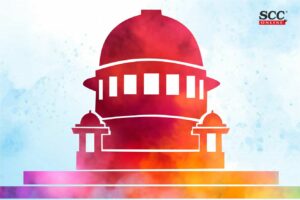Supreme Court: In spite of going through several rounds of litigation and long hours consideration, the Adhaar Controversy had once again popped up before the Supreme Court. The Constitution Bench comprising of A.M. Khanwilkar, D.Y. Chandrachud, Ashok Bhushan, S. Abdul Nazeer and B.R. Gavai, JJ., addressed the review petition against the final verdict in K.S. Puttaswamy (Aadhaar-5 Judges) v Union of India, (2019) 1 SCC 1. Among the issues which arose for decision, the Court had to answer two critical questions:
- Whether the decision of the Speaker of the House of People under Article 110(3) of the Constitution, to certify a bill as a ‘Money Bill’ under Article 110(1) is final and binding, or can be subject to judicial review; and
- If the decision is subject to judicial review, whether the Aadhaar (Targeted Delivery of Financial and Other Subsidies, Benefits and Services) Act, 2016 had been correctly certified as a ‘Money Bill’ under Article 110(1) of the Constitution?
The circumstances giving rise to the instant review petition were that the issue whether judicial review can be exercised over a decision of the Speaker of the House of People under Article 110(3), arose subsequently before another Constitution Bench in Rojer Mathew v South Indian Bank Ltd., (2020) 6 SCC 1, wherein the majority opinion noted that the first question was not adequately answered in the Puttaswamy (Aadhaar-5J.) case and It also noted its doubts on the determination of the second question, consequently, the majority referred the matter to the larger Bench for consideration.
Majority Verdict
On the first question, the majority stated that judicial review of whether a Bill is a ‘Money Bill’ would be admissible under certain circumstances having regard to the law laid down by this Court. While answering the second question, the majority held that Section 7 of the Aadhaar Act had elements of a ‘Money Bill’, and the other provisions were incidental to the ‘core’ of the Aadhaar Act. Hence, the majority held that the Aadhaar Act had been correctly certified as a ‘Money Bill’ under Article 110(1).
Therefore, opining that change in the law or subsequent decision/judgment of a coordinate or larger Bench by itself cannot be regarded as a ground for review of a final judgment; the majority held that there was no case for review of Aadhar verdict.
Dissenting View
Maintaining his dissent from the majority like the final verdict on the issue, D.Y. Chandrachud, J., once again expressed his dissent from the majority by observing that the analysis of the majority opinion in Puttaswamy (Aadhaar-5J.) in relation to the second question, i.e., whether the Aadhaar Act was a ‘Money Bill’ under Article 110 had been doubted by a coordinate bench in Rojer Mathew, when the first question was referred to a larger bench. Since the larger bench has not been constituted, and is yet to make a determination, Justice Chandrachud stated,
“Dismissing the present batch of review petitions at this stage – a course of action adopted by the majority – would place a seal of finality on the issues in the present case, without the Court having the benefit of the larger bench’s consideration of the very issues which arise before us.”
In Rojer Mathew’s case, another Constitution Bench had expressed,
“116. Upon an extensive examination of the matter, we notice that the majority in K.S. Puttaswamy (Aadhaar-5 J.) [K.S. Puttaswamy (Aadhaar-5 J.) v. Union of India, (2019) 1 SCC 1] pronounced the nature of the impugned enactment without first delineating the scope of Article 110(1) and principles for interpretation or the repercussions of such process. It is clear to us that the majority dictum…did not substantially discuss the effect of the word “only” in Article 110(1) and offers little guidance on the repercussions of a finding when some of the provisions of an enactment passed as a “Money Bill” do not conform to Articles 110(1)(a) to (g). Its interpretation of the provisions of the Aadhaar Act was arguably liberal and the Court’s satisfaction of the said provisions being incidental to Articles 110(1)(a) to (f), it has been argued, is not convincingly reasoned, as might not be in accord with the bicameral parliamentary system envisaged under our constitutional scheme.”
Calling it a constitutional error to hold at this stage that no ground exists to review the judgment, Justice Chandrachud opined that the larger bench’s determination would have an undeniable impact on the validity of the reasons expressed in Puttaswamy (Aadhaar-5J.), on the constitutional issues pertaining to and arising out of the certification by the Speaker of the House of People.
Further on the issue that change in the law or subsequent decision/judgment of a coordinate or larger Bench by itself cannot be regarded as a ground for review against a final judgment, Justice Chandrachud differentiated between a situation where a judgment attains finality and the view propounded by it is disapproved by a larger bench subsequently as the instant review petitions had all been filed before the judgment in Rojer Mathew was delivered and opined that there is a strong reason for not to dismiss them pending the decision of the larger bench, especially in light of the adverse consequences highlighted above.
Conclusion
In view of the above, the review petitions were dismissed.
[Beghar Foundation v. K.S. Puttaswamy, (2021) 3 SCC 1, decided on 11-01-2021]
Kamini Sharma, Editorial Assistant has put together this report
Appearance by:
For the Petitioners: M. T. George, Advocate

